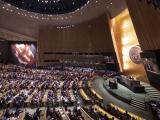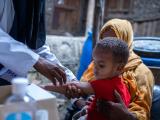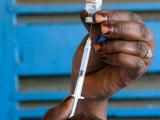May 23, 2003 (CIDRAP News) The World Health Organization (WHO) today lifted its recommendation against travel to Hong Kong and China's Guangdong province, signaling that the SARS (severe acute respiratory syndrome) outbreak is declining in its original strongholds.
Both places have fewer than 60 patients who are still infectious, and the average number of new cases per day has hovered at less than five in recent days, WHO officials said in a news release.
"Guangdong was the first place in the world to have cases of SARS but I am pleased to note that due to the efforts of the local and national health authorities, with support from WHO and partners, the outbreaks in Guangdong and in Hong Kong are being contained," said WHO Director-General Gro Harlem Brundtland.
SARS emerged in Guangdong last November, and it spread to Hong Kong when a sick Chinese professor traveled there and infected others in late February. From Hong Kong the disease spread to several other countries, including Vietnam, Singapore, Canada, and Taiwan. The WHO advisory against nonessential travel to Hong Kong and Guangdong had been in effect since Apr 2.
"WHO's decision shows that Hong Kong has successfully contained the spread of severe acute respiratory syndrome," Dr. Yeoh Eng-kiong, Hong Kong's secretary for health, welfare, and food, said in a news release.
In Hong Kong, the 3-day average number of new cases per day has been below five for the past 6 days, and the outbreak has been in a sustained decline since the rate of new cases peaked in late March, the WHO said. "All new cases in the past 20 days have occurred in people who were already identified as contacts of a person with SARS and under active surveillance," the statement said.
The 3-day average number of new cases in Guangdong has been less than five for the last 11 days, the WHO said. Local transmission has fallen to low levels in recent weeks, thanks to the efforts of provincial health authorities, the agency said.
The WHO continues to advise against nonessential travel to other areas of China, including Beijing, Hebei, Inner Mongolia, Shanxi, and Tianjin, as well as Taiwan. Officials said that "continuing intensive efforts" are needed to contain SARS in those areas.
In other SARS developments, Hong Kong researchers who examined animals in a live-animal market in southern China found the SARS coronavirus in three different mammal species, according to Associated Press and New York Times reports. The virus turned up in six masked palm civetsa cat-like tree dwelleras well as in a badger and a raccoon dog.
Klaus Stohr, a SARS virologist with the WHO, said it was not possible to judge whether any of the animals transmitted the virus to people or the reverse, according to the AP report. He said the animals could have acquired the virus from feed used at the market or from human waste used as fertilizer.
The masked palm civet is considered a delicacy in southern China, according to the New York Times report. Stohr was quoted as saying that a recent study from Guangdong revealed that more than 30% of the early SARS patients in southern China were food handlers.
Elsewhere, Toronto officials announced yesterday that four possible new SARS cases are under investigation in the city, where the SARS outbreak had been considered contained. Toronto Public Health signaled that all four patients had some connection to St. John's Rehabilitation Hospital; the agency said anyone who was in that hospital between May 9 and 20 should go into home quarantine and contact health authorities. The hospital "is closed to admissions, visitors, discharges, and transfers," the agency said.
The Toronto cases prompted the Centers for Disease Control and Prevention (CDC) today to reinstate its Toronto travel alert, canceled just 3 days ago. The CDC is not warning against travel to Toronto but says travelers who go there should take precautions, such as avoiding healthcare settings and other places where SARS transmission may have occurred. "CDC does not recommend the routine use of masks or other personal protective equipment while in public areas," officials said. The agency had lifted the travel alert May 20 because more than 30 days had passed since the onset of the last reported case in Toronto.
Two of the four Toronto patients are related, one is a healthcare worker, and one returned recently from Asia, according to an AP report that quoted Dr. Barbara Yaffe, a Toronto health official.
With 24 fatal cases in Toronto, Canada is the only country outside Asia that has had SARS deaths. The WHO advised against unnecessary travel to Toronto for several days in late April. On May 14 the agency took Toronto off the list of areas with recent local transmission of SARS, after the city went 20 days with no new locally acquired cases.
The WHO today reported 77 new cases of SARS, including 55 in Taiwan, bringing the worldwide cumulative total to 8,117. Seven deaths were reported today, raising the total to 689. Probable cases in the United States remained at 65.
See also:
WHO SARS site
http://www.who.int/csr/sars/en/


















